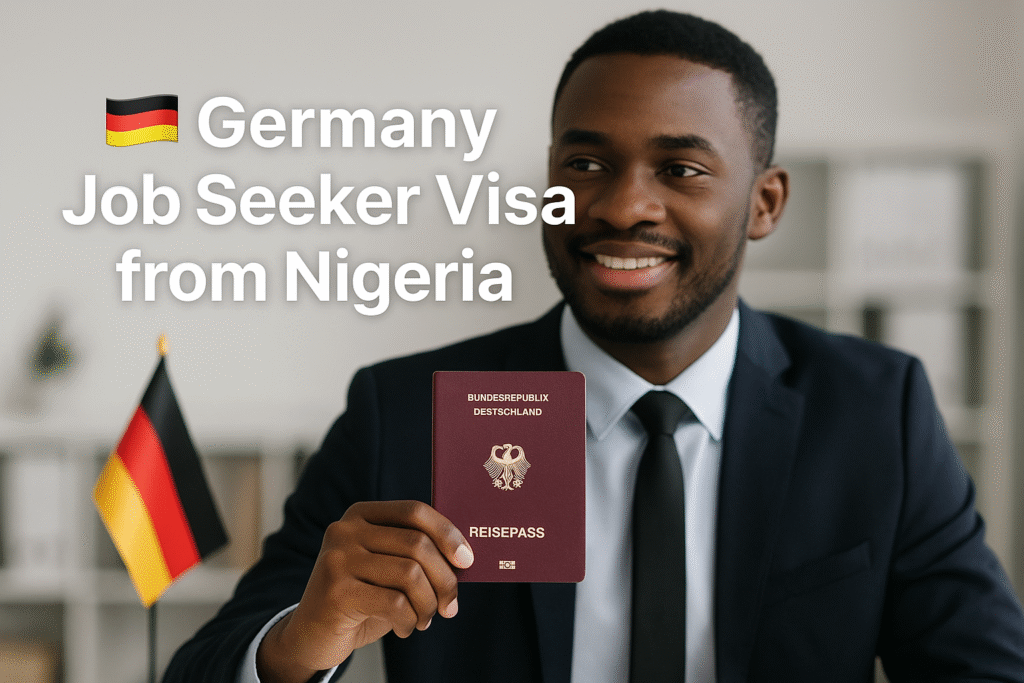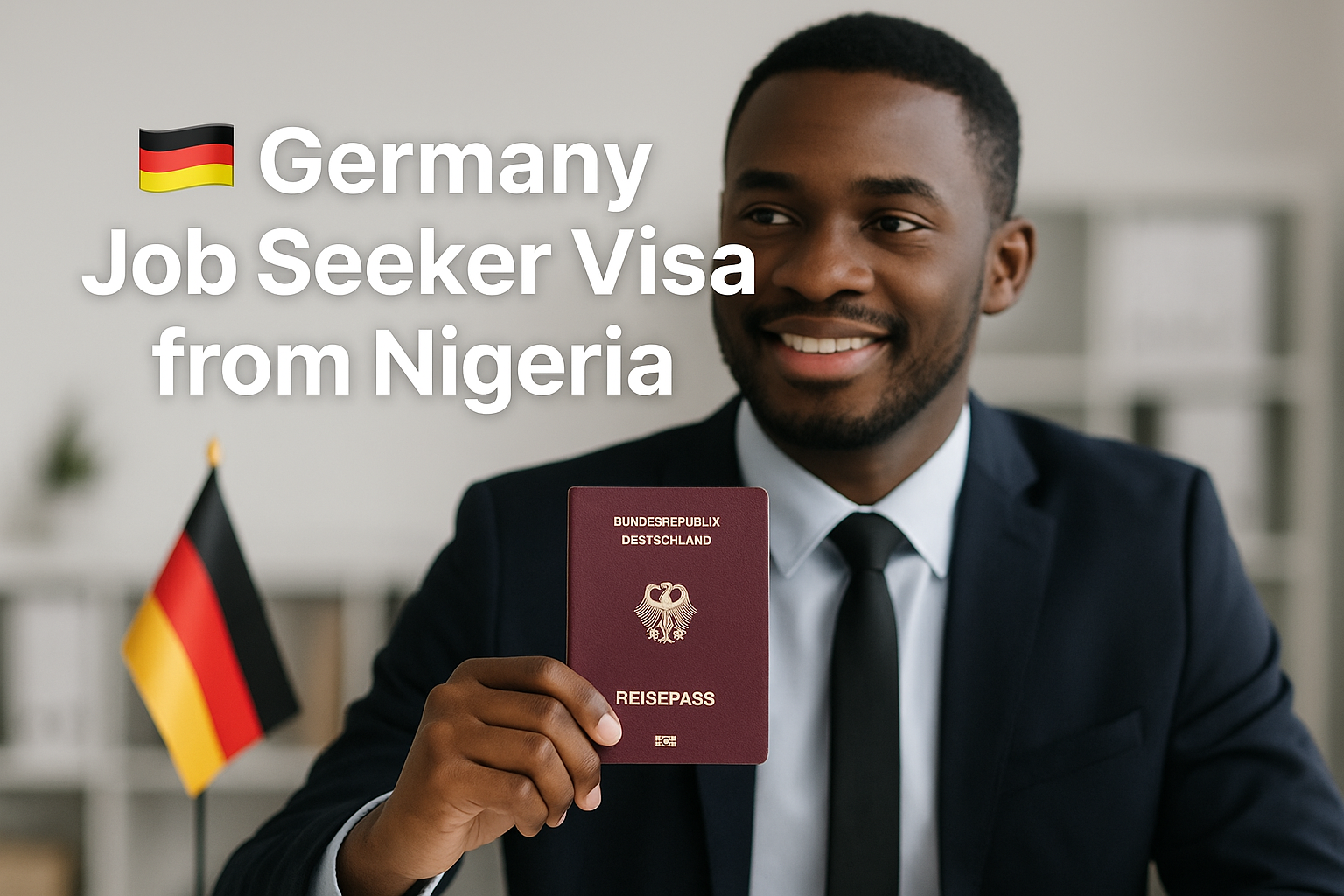Learn how to apply for the Germany Job Seeker Visa from Nigeria in 2025 — requirements, step-by-step process, blocked account, and success tips for Nigerian professionals.

What Is the German Job Seeker Visa?
The Germany Job Seeker Visa is a temporary residence permit that allows qualified professionals from non-EU countries — including Nigeria — to travel to Germany for up to six months to search for employment.
It’s one of Europe’s most practical immigration routes because it doesn’t require a prior job offer — instead, it gives you time in Germany to meet employers face-to-face.
Key Benefits for Nigerian Professionals
✅ Stay up to 6 months in Germany while job hunting
✅ Apply for the EU Blue Card once you get a qualifying job offer
✅ Bring dependents later after obtaining your residence permit
✅ Access one of the most stable job markets in Europe
“The German Job Seeker Visa was my bridge from Lagos to Berlin. It’s an incredibly smart route because it allows you to hunt for a high-paying job in person — which is nearly impossible to do from Nigeria.”
Duration: 6 months (non-extendable unless converted to a residence permit)
Pathway: Job Seeker Visa → Work Visa → EU Blue Card → Permanent Residence
The 5 Mandatory Requirements for Nigerian Applicants
Recognized Degree/Qualification (Anabin Check)
To qualify, your Nigerian degree must be recognized in Germany. The German government uses the Anabin database to verify whether foreign degrees are equivalent to German qualifications.
- H+ status: fully recognized
- H- or H+/-: needs further evaluation through ZAB (Central Office for Foreign Education)
“Getting my Nigerian degree officially recognized via Anabin was my first bureaucratic hurdle. Make sure your qualification is H+ early on — it can make or break your application.”
If your school or program is missing, you’ll need a Statement of Comparability via ZAB:
🔗 ZAB Application Guide
Sufficient Financial Means (Blocked Account)
Every applicant must open a German blocked account (Sperrkonto) showing sufficient funds to support living expenses while in Germany.
As of 2025, the minimum amount required is €1,027 per month × 6 months = €6,162.
You can open this account through:
Many Nigerian students use Fintiba because it’s approved by the German Federal Foreign Office.
💡 Tip: Keep an extra €500–€1,000 for health insurance and rent deposits.
Proof of Accommodation
Before applying, you must prove where you’ll stay during your job search in Germany.
Acceptable proof includes:
- Hotel or Airbnb booking
- Hostel reservation
- Letter of invitation from a host
Useful platforms: Booking.com, HousingAnywhere, WG-Gesucht.
Health Insurance Coverage
You’ll need travel health insurance covering at least €30,000 for the duration of your stay.
Recommended providers:
Once in Germany, you’ll switch to public or private German health insurance such as TK (Techniker Krankenkasse) or AOK.
Proof of Previous Work Experience
You must demonstrate relevant professional experience (minimum 2–3 years) in your field. Provide:
- Employment letters
- Reference letters
- Payslips or appointment letters
Include a German-style CV with dates in DD/MM/YYYY format and a passport photo.
Step-by-Step: The Application Process in Nigeria
The German Job Seeker Visa is processed through the German Embassy in Abuja or the Consulate in Lagos.
Documents Checklist and Translations
Prepare the following (2 sets of copies):
- Completed visa application form
- Valid Nigerian passport (minimum 12-month validity)
- Passport photos (biometric standard)
- Degree certificate + Anabin printout
- Proof of blocked account
- Proof of accommodation
- CV and motivation letter
- Proof of work experience
- Health insurance
- Application fee: €75 (to be paid in Naira)
All documents not in English or German must be translated by a sworn translator in Nigeria.
You may find certified translators via:
🔗 German Embassy Abuja — Translators List
Booking the Appointment and Interview Tips
All visa appointments are booked online through:
🔗 German Embassy Visa Appointment Portal (Abuja)
Average wait time: 4–8 weeks.
At your interview:
- Dress professionally
- Bring all originals and copies
- Expect questions about your career, job search plan, and why Germany
Common questions:
- “Which city in Germany do you plan to stay in?”
- “What kind of job are you targeting?”
- “How do you plan to cover your expenses?”
Understanding Visa Processing Times and Fees
Processing time: 6–10 weeks (after interview).
Visa fee: €75 payable in Naira (non-refundable).
If approved, your passport will be stamped with a D-Visa allowing six months stay in Germany.
The Ultimate Goal: Converting to a Residence Permit
Once you land a job, you can convert your visa to a German residence permit or an EU Blue Card without leaving Germany.
Converting the Visa to a Residence Permit (Paragraph 18a/b)
Under §18a and §18b of the German Residence Act, skilled professionals can transition to full residence once employed.
Requirements:
- Valid work contract
- Salary meeting EU Blue Card threshold (€45,300 in 2025 or €41,041 in shortage occupations)
- German health insurance and housing contract
🔗 Federal Office for Migration and Refugees (BAMF)
Strategies for a Successful Job Hunt in Germany
Finding a job in Germany as a non-EU citizen can be challenging — but there are effective strategies:
- Use English-friendly job portals:
- Optimize your German-style CV — use a photo, date of birth, and a brief summary at the top.
- Network with Nigerian diaspora groups on LinkedIn and Facebook.
- Focus on small to mid-size firms that hire English-speaking professionals.
“I found that networking on LinkedIn and targeting smaller, international startups was more effective than applying to huge German corporations. Focus on companies that explicitly use English as their working language.”
Success Rate for Nigerian Applicants
According to 2024 figures from the German Federal Foreign Office, the approval rate for Job Seeker Visas globally is around 70%. Nigerian applicants with recognized degrees and complete documentation have a success rate of 65–75%.
Top reasons for rejection:
- Unrecognized qualifications (Anabin issue)
- Insufficient blocked account funds
- Missing work experience
- Incomplete translations
💡 Tip: Always attach a professional cover letter explaining your motivation and job strategy in Germany.
Next Steps and Expert Guidance
The Germany Job Seeker Visa from Nigeria is one of the smartest legal pathways for skilled professionals seeking global careers. It offers structure, transparency, and a clear path to permanent residence through the EU Blue Card.
If you’re serious about relocating, start by checking your Anabin status, funding your blocked account, and securing your appointment early — demand is high in 2025.
Get Expert Help
For personalized guidance, consider consulting:
Related Articles
- Skilled Worker Visa UK for Nigerians: Full Requirements
- Canada vs UK Immigration Pathways in 2025
- Study in Germany: DAAD Scholarships for Nigerians 2025
